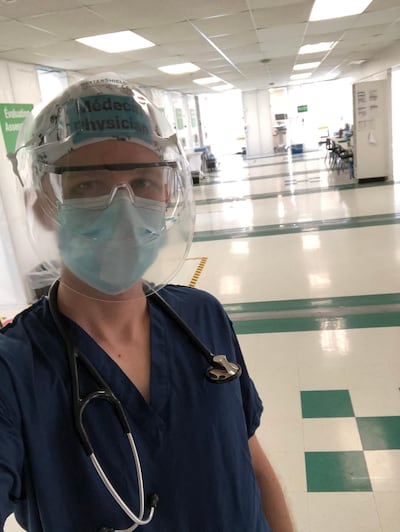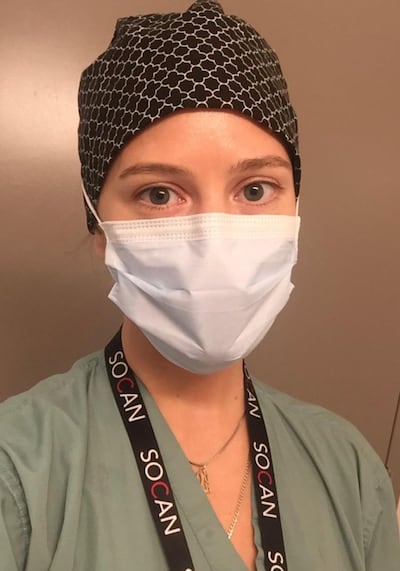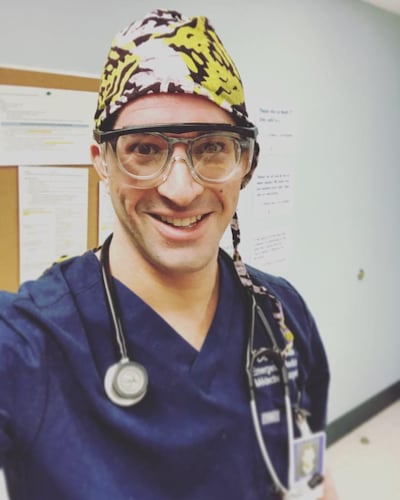Dr Chris Murray is tired. The hospital physician has been in the trenches of Canada’s fight against Covid-19 for over a year and he’s worried the worst may be ahead of him.
During his latest shift at Montfort Hospital in Ottawa, Ontario, he and his colleagues saw the most admissions for Covid-19 since the pandemic began.
Most alarming to Dr Murray is the age of his new patients. He said he’s seeing people in their late twenties and early thirties, which was not the case in previous waves.
"I saw a person in their early thirties who didn't have any underlying health conditions, who actually had to go to the intensive care unit because of respiratory distress," Dr Murray told The National.
He attributes the situation to the coronavirus variants that have become prevalent in Canada, though he did not know which ones had infected his most recent patients.
More transmissible variants including B117, first identified in England, and P1, known as the Brazil variant, have been detected in Canada.
Ontario, its largest province, has been hit especially hard in recent days by surging cases.
On Sunday, Ontario reported 4,456 new cases, a single-day record. The province’s rolling seven-day average of new cases is 3,767 per day which is 1,000 more per day than was recorded last week.
With the influx of younger, sicker patients than seen previously, Canadian hospitals and their medical staff are overwhelmed.
“As we are seeing fewer and fewer critical care beds, we’re having to look and face the real possibility of what’s called the ‘critical care triage protocol’ where we will have to use this kind of ethical framework to help to decide who will then have access to these critical care resources,” Dr Murray said.

Resources stretched to their limits
Many hospitals in Canada are already at capacity.
In Ontario, elective, or non-essential, surgery has been postponed to free up space.
Sick Kids, a children’s hospital in Toronto, has opened its intensive care unit to adults. A hospital representative said it had seven adults in ICU beds already and expected more by Monday evening.
“In Ontario we’re seeing extraordinary pressure on our critical care system unlike any that we’ve seen in any other part of the pandemic,” said Jean-Paul Soucy, a doctoral student in epidemiology at the University of Toronto.
Mr Soucy is a co-founder of the Covid-19 Canada Open Data Working Group, which tracks cases across the country.
“April is going to be incredibly tough, even if we turn around the case numbers tomorrow, because you already have a lot of people who are infected and who are getting to where their situation deteriorates and they’re going to end up in the hospital or ICU,” he said.
Sophie Tache-Green, an emergency and intensive care nurse in Toronto, said the dramatic influx of cases had put hospitals and staff under enormous pressure.

“You have patients showing up to the waiting room who are confirmed positive for Covid and we have nowhere to put them because all of our beds are full. That is very challenging,” she said.
Ms Tache-Green said that in the past month, she and her colleagues have had to take on more patients than usual.
“Because of the numbers, we’re very often on a ‘critical care bed alert’, meaning all of the critical care beds are full, there’s a lot more doubling up, meaning you’ll have two patients, which is really exhausting.”
Canadians urged to remain vigilant
On Friday, Prime Minister Justin Trudeau pleaded with Canada’s younger generation to take the variants seriously.
“Even if you’re younger you can get sick very, very quickly, or you can give the virus to someone you love who can get very sick,” Prime Minister Trudeau said. “I know you have already done so much and sacrificed so much, but we just need you to hang in there a little bit longer.”
It’s a message echoed by doctors across the country.
“We’re still in it. This is still a global pandemic and I know we all want that quick fix and we all want to get back to our lives, but we still have to be quite diligent and stay home if we can,” said Dr Jason Freder, who works at a community hospital in Delta, British Columbia.

Like Dr Murray, he’s seen a rise in cases among his patients in the 18 to 55 age group.
“We really do need to hunker down more and people need to recognise that this is quite different now than it was before,” Dr Murray said of the third wave.
Ms Tache-Green wants people to understand that the repercussions from this third wave will be felt for many months to come, even after cases have gone down.
“We had a patient who came in in December who many people [at the hospital] didn’t see recovering and last week they were discharged from the ICU and had made a huge recovery. So that makes us very hopeful, but it’s also kind of terrifying because with this third wave, [with] all of the people coming into ICUs, these won’t be quick turnarounds,” she said.
“You either lose someone, which is terrible, or they stay in the ICU for months and that’s an ICU bed that doesn’t open up for other patients to come into ... The repercussions will be felt for a very long time.”


